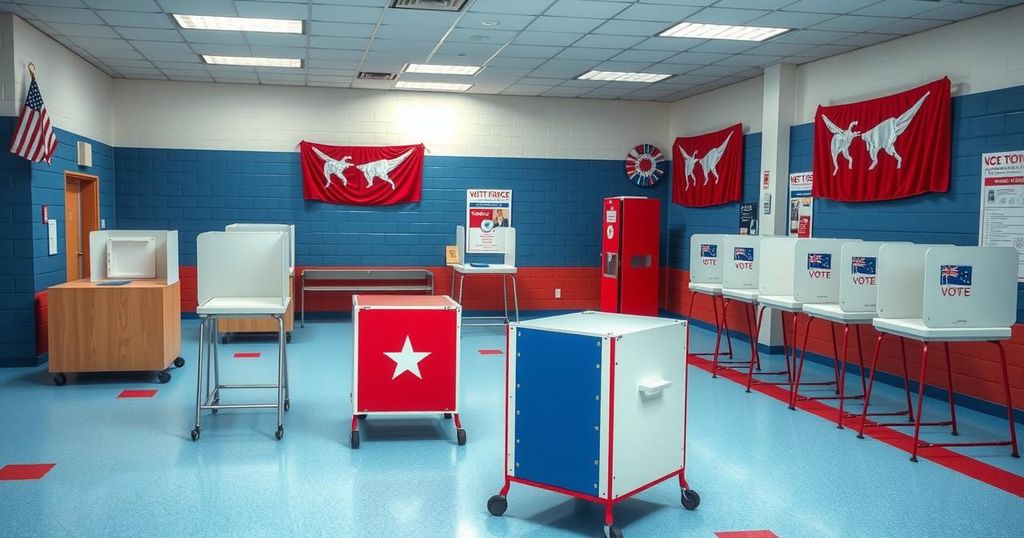New Jersey’s primary elections are underway, featuring competitive races for governor in both parties. Democratic candidates include prominent lawmakers like Josh Gottheimer and Mikie Sherrill while Republicans back Jack Ciattarelli, endorsed by Trump. Voting is open from 6 a.m. to 8 p.m., with early voting taking place prior. The results could signal influential public sentiments amid ongoing national issues.
Polls are now open in New Jersey for the primary elections, which include pivotal races for governor. On this election day, voters are set to decide on both Democratic and Republican candidates, and the outcomes could resonate beyond the state. The results may reflect public sentiment regarding President Trump’s influence and how Democrats should navigate their opposition.
The stakes are high. New Jersey is among just two states with gubernatorial primaries this year, the other being Virginia. Governor Phil Murphy, who made history as the first Democrat to be reelected in over 40 years in 2021, will not endorse any successor since he’s term-limited. This has set the stage for an intriguing race amidst several candidates vying for the open seat.
On the Democratic front, the primary includes a crowded field of political veterans like U.S. Reps. Josh Gottheimer and Mikie Sherrill, along with Jersey City Mayor Steven Fulop and Newark’s mayor Ras Baraka. Each candidate has been raising significant amounts — Gottheimer leads with $9.1 million, while Sherrill and Fulop closely follow them. Amid this race, immigration has also emerged as a leading issue, especially after Baraka’s recent run-in with the law during a protest.
On the Republican side, the veteran politician Jack Ciattarelli is contending for the nomination once more. In 2021, he came strikingly close to unseating Murphy, losing by only three percentage points. Ciattarelli has attracted attention from Trump, who boosted his candidacy with an endorsement and even rallied for him virtually just days before the primary. Other Republican candidates include state Sen. Jon Bramnick and former Englewood Cliffs Mayor Mario Kranjac, all of whom have expressed support for Trump’s policies.
As the candidates vie for votes, local issues—like high property taxes and the rising cost of living—are certainly on the table. Yet, it’s impossible to ignore the national political climate influencing these state races. Analysts like Ben Dworkin emphasize that these elections are crucial, stating that Democrats risk falling further behind without maintaining control of the governor’s office.
Voters can cast their ballots from 6 a.m. to 8 p.m. this Tuesday. Note that early in-person voting took place from June 3 to 8, with mail-in ballots distributed starting in April. A curious twist is that registered independent voters can choose which primary to participate in, potentially adding an unpredictable element to the outcomes.
Alongside the governor’s race, all 80 state General Assembly seats are up for grabs. While many districts are uncontested, primary voters are free to select up to two candidates per district. However, the state Senate seats won’t be contested until 2027, although a special election in District 35 may slightly stir the waters.
In light of the current economic state, both parties are expected to push narratives of frustration. While Democrats will likely highlight the unpopularity of several aspects of Trump’s agenda, Republicans will aim to blame economic hardships on the Democratic leadership over the past eight years. It’s a delicate balance as both sides gear up for the general election later this year.
New Jersey has leaned heavy on Democratic leadership in Senate and presidential races—yet the odd-numbered gubernatorial elections have shown a different trend, swinging between parties. Democrats enjoy a statistical advantage with their registration numbers but the party affiliation gap has been narrowing in recent years, making the primaries even more critical.
As for primary day specifics? It’s set for June 10, 2025, with a vow from the election office that anyone in line by 8 p.m. will get to vote. Registered party members can only partake in their designated party’s primary, and voters can look for polling places via the New Jersey Division of Elections.
In conclusion, New Jersey’s primary elections today will not only set the stage for future leadership in the state but may also reflect the broader responses to national political dynamics, especially regarding Trump’s ongoing influence. With both parties eager to capitalize on voter sentiments around economic issues, the outcomes could indicate crucial shifts in political momentum as New Jersey heads into its gubernatorial race.
Original Source: www.nbcnewyork.com






